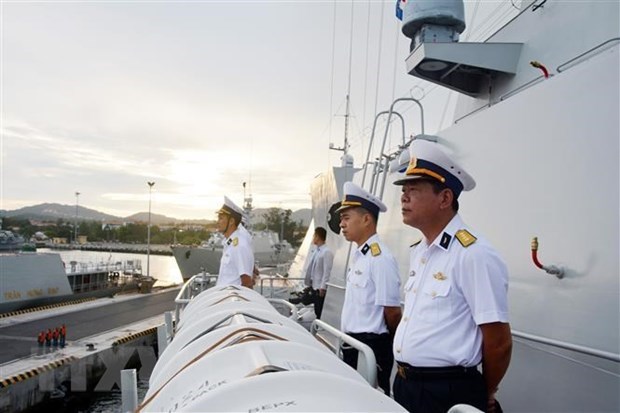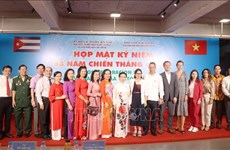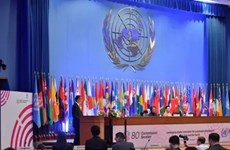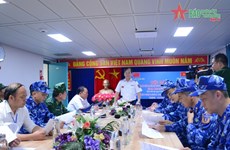Defence ties important to Vietnam-Russia partnership: ambassador
The Vietnam People’s Army (VPA) will further enhance cooperation with Russian armed forces on the basis of mutual trust and respect, Vietnamese Ambassador to Russia Ngo Duc Manh said in a recent article.
 A Vietnamese navy frigate visits Russia and takes part for the first time in the Russian Navy Day parade last July. (Photo: VNA)
A Vietnamese navy frigate visits Russia and takes part for the first time in the Russian Navy Day parade last July. (Photo: VNA)Moscow (VNA) – The Vietnam People’s Army (VPA) will further enhance cooperation with Russian armed forces on the basis of mutual trust and respect, Vietnamese Ambassador to Russia Ngo Duc Manh said in a recent article.
The article was published in Russia’s Independence newspaper on December 13 on the occasion of the 75th founding anniversary of the VPA (December 22).
The ambassador stressed that the anniversary offers a chance to look back at the effective cooperation between Vietnam and Russia, highlighting the spiritual and material support from the former Soviet Union and present-day Russia during Vietnam’s struggle for national independence, as well as the cause of national construction, reform and defence.
He stated that national defence is one of the important areas of cooperation in the Vietnam-Russia comprehensive strategic partnership, and the collaboration is developing strongly and effectively, especially in delegation exchanges, military technology and personnel training.
The two sides held more than 70 events connected to defence cooperation during the Vietnam Year in Russia 2019, and many mutual visits by military delegations. Vietnam sent delegations to the 2019 International Army Games, the eighth Moscow Conference on International Security, the 2019 Army Military Technology Forum and multilateral events hosted by the Russian Ministry of Defence. A Vietnamese navy frigate visited Russia and took part for the first time in the Russian Navy Day parade last July.
According to the Ambassador, both Vietnam and Russia back long-term, pragmatic and trustworthy defence ties on the basis of signed treaties and agreements, including the plan for defence cooperation and development for 2018-2020, while facilitating the signing of new cooperation deals, including the joint vision declaration on defence cooperation for 2019-2023.
In the article, the Ambassador also reviewed the development of the VPA since its foundation on December 22, 1944, and highlighted its glorious victories during the struggle against the French colonialists (1945-1954) with the peak Dien Bien Phu victory in 1954 that paved the way for the signing of the Geneva Accords, restoring peace in Indochina.
Following the resistance war against the US from 1954-1975, the army continued to perform its international missions in Cambodia, helping the neighbouring country with national restoration and construction.
With a pool of about 450,000 officers and soldiers, along with 5 million people on standby, the VPA has actively engaged in military cooperation with neighbouring countries, other members of the Association of Southeast Asian Nations (ASEAN) and nations that have maintained a traditional friendship with Vietnam.
At the same time, the army has participated in regional and international institutions and organisations, as well as UN peacekeeping operations, he said, stressing that the country’s defence policy is based on the principles of equality and mutual respect.
Manh emphasised that Vietnam respects sovereignty, unity, territorial integrity and the interests of other countries in accordance with the UN Charter and international law, while requiring other countries to respect Vietnam’s independence and national interests.
“While Vietnam resolutely fights against all invasion activities, the country advocates the settlement of disputes on territorial sovereignty in a peaceful way on the basis of international law,” the ambassador wrote.
Regarding disputes at sea, he said Vietnam has full historical evidence proving its sovereignty over the Hoang Sa (Paracel) and Truong Sa (Spratly) archipelagoes, but it is still committed to peaceful negotiations in order to address disputes in accordance with the 1982 UN Convention on the Law of the Sea (1982 UNCLOS), and called on relevant sides to seriously observe the Declaration on the Conduct of Parties in the East Sea (DOC) towards reaching a Code of Conduct in the East Sea (COC)./.












